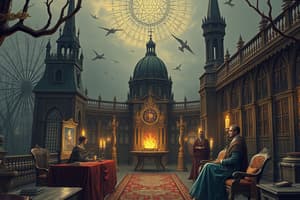Podcast
Questions and Answers
What is the speaker's primary goal in the first part of the passage?
What is the speaker's primary goal in the first part of the passage?
- To seek forgiveness for past mistakes
- To harden himself to commit a violent act (correct)
- To reflect on the consequences of his actions
- To seek guidance from a higher power
What is the significance of the 'murd'ring ministers' in the passage?
What is the significance of the 'murd'ring ministers' in the passage?
- They are the witches who foretold his fate
- They are Macbeth's own thoughts and emotions
- They are evil spirits that encourage Macbeth's dark deeds (correct)
- They are the ghosts of his victims
What is the symbolic meaning of the 'thick night' in the passage?
What is the symbolic meaning of the 'thick night' in the passage?
- A period of spiritual reflection
- A moment of great insight
- A time of moral clarity
- A time of darkness and chaos (correct)
What is the significance of Macbeth's titles, 'Great Glamis' and 'worthy Cawdor', in the second part of the passage?
What is the significance of Macbeth's titles, 'Great Glamis' and 'worthy Cawdor', in the second part of the passage?
What is the central idea of the second part of the passage?
What is the central idea of the second part of the passage?
What is the tone of the first part of the passage?
What is the tone of the first part of the passage?
What is the theme explored in the first part of the passage?
What is the theme explored in the first part of the passage?
What is the literary device used in the phrase 'Thicken my blood'?
What is the literary device used in the phrase 'Thicken my blood'?
What is the significance of the 'letters' mentioned in the second part of the passage?
What is the significance of the 'letters' mentioned in the second part of the passage?
How does Macbeth's language change throughout the passage?
How does Macbeth's language change throughout the passage?
Flashcards are hidden until you start studying
Study Notes
Macbeth's Thoughts and Confusion
- Macbeth's thoughts of murder are unsettling and make him question his own identity.
- He is torn between his desire to be king and the morality of taking action to achieve it.
- Macbeth thinks that if fate wants him to be king, it will happen without his effort.
Banquo's Observations
- Banquo notices Macbeth's distraction and thinks he is in a daze.
- Macbeth is not comfortable with his new titles and they feel like new clothes that don't fit yet.
Macbeth's Inner Turmoil
- Macbeth is aware that the witches' prophecies have come true, which makes him think that he will become king.
- He is torn between the supernatural temptation and his moral conscience.
- Macbeth is afraid of the consequences of his actions and the danger of his own thoughts.
Macbeth's Soliloquy
- Macbeth wants to suppress his feelings of remorse and guilt.
- He wants to thicken his blood and clog his veins so that he won't feel compassion or remorse.
- Macbeth invokes the darkness to cover his evil deeds and asks for his milk to turn into gall, making him more ruthless.
Studying That Suits You
Use AI to generate personalized quizzes and flashcards to suit your learning preferences.




